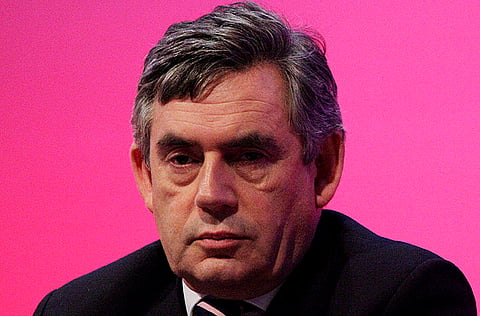This is no time to vote Tory
Even if this government is responsible for the mess the UK is in, they should have to sort it out

Campaigning in the UK is in full swing, with Prime Minister Gordon Brown setting May 6 as the election date. Actually, since the beginning of this year, everything said and done in British politics has been linked to the election. Government statements, including the Chancellor's budget report, were all interpreted as electioneering. Briefings by senior officials, from Brown down to junior ministers, were all meant to send a message that Labour is best placed to lead the country for a fourth term. Members of the party also take every opportunity to criticise the opposition Conservative (Tory) party's policy statements. The latest example of this competition has been the row between the government and business over the Tory pledge to scrap national insurance contribution increases included in the budget.
Tories, likewise, have used public platforms to attack the government and blame it for Britain's ills. They focus on issues of public sensitivity, from immigration policy to council tax. In addition to these political statements and policy presentations, the Tories are also taking advantage of local councils under their leadership. Some even believe the state of London's roads is related to the election. Road works and maintenance are making driving or commuting around London a torturous experience at present. It is claimed that Conservative councils hope angry commuters will blame Labour for allowing roads to get into such a state and reward the opposition for taking action to improve the situation. Though that might seem far-fetched, it can't be ruled out. In fact, Labour might be doing something similar with central government policy. Meanwhile the third major party, the Liberal Democrats (Lib Dems), is in the privileged position of being able to attack both the Labour government and Tory opposition without proposing a workable alternative.
Economic challenge
The economy is the main issue at the heart of this election, as people are still losing jobs and struggling with the high cost of living. Forget about official inflation rates, the price of everything from petrol to bread is shooting up as the pound sterling devalues. The public deficit is mounting and any government will have to cut spending and raise taxes to balance public finances. This was the last developed economy to come out of recession and the recovery is weak and possibly unsustainable.
The main concern as the gap between the leading parties narrows is the possibility of a hung parliament, with neither Labour nor the Conservatives gaining a sufficient majority to form a government. That could be disastrous for the economy in particular.
People by nature desire change and Labour has been in power long enough to justify voting against them. Many analysts also blame the government for the dire state of the economy. Big business believes Labour has run out of ideas, despite the fact that this government has done more for businesses than a Conservative one likely would have. Tory leader David Cameron and his shadow chancellor George Osborne are saying the right things now, but while some of their proposals are theoretically brilliant they are practically difficult to implement.
In the previous election, I voted Lib Dem as a protest — Tony Blair was seeking re-election and I was angry over his role in the Iraq war. My vote, and those of many others who protested against Labour but did not vote Tory, helped to erode Labour's majority. While this didn't bring the Lib Dems to power, it did benefit the Tories by default.
That is why this time I'm voting Labour to give it the public mandate to clean up the mess created by its rule and spare the country the dangerous experimentation of an untested Tory leadership. Moreover, I don't think the situation in the UK — either economically or politically — calls for another Blair, even one from the centre-right. Actually, since Cameron was elected to lead the opposition, all of his policies have rehashed what Blair, Brown and Peter Mandelson proposed in rebranding Labour as ‘New Labour' before they won their first election in 1997. That's why Cameron used to be labelled ‘Tory Blair', even though he has been trying to develop his own brand.
Britain can't afford to have a new leadership playing into the hands of the same businesses that led the country to the bad state it's in now. If Labour messed up the economy and politics, give it another term to sort it out. Or, in the worst case scenario, let them hit bottom so that the Tories or someone else can start afresh in five years' time.
Dr Ahmad Mustafa is a London-based Arab writer.


